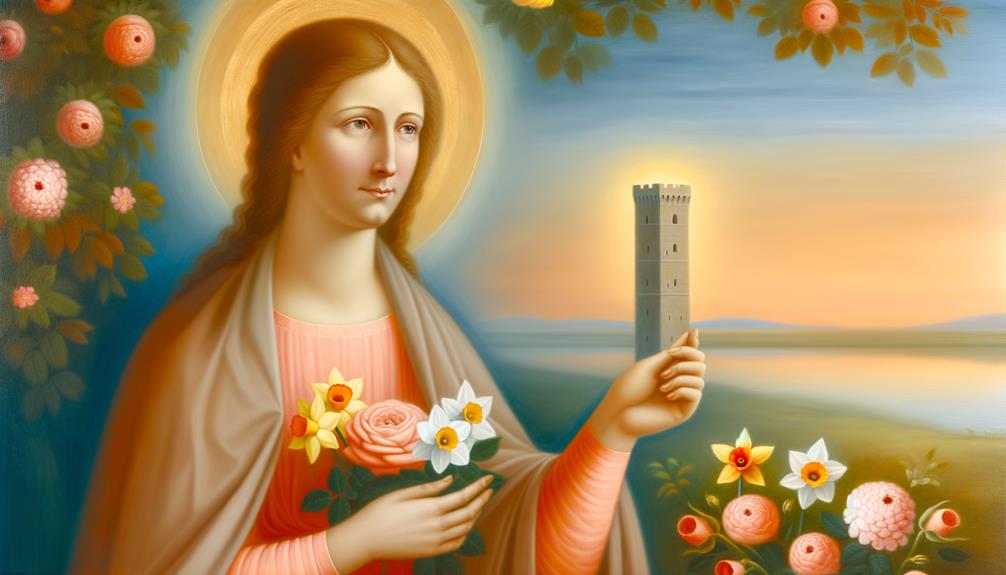Meaning of the Name Barbara
The name Barbara originates from the Greek word 'barbaros,' which historically meant 'foreign' or 'strange.' Its usage reflects the ancient tendency to classify individuals based on language and origin. The name gained cultural and religious significance through Saint Barbara, symbolizing mystery, strength, and independence.
Prominent individuals named Barbara include Barbara Tuchman, Barbara Jordan, and Barbara Walters, highlighting its association with intellectual and transformative impact. While its popularity peaked mid-20th century in Western countries, trends have shifted in modern times.
Various linguistic adaptations showcase the cultural nuances of the name. Discovering the complexities behind Barbara can further reveal its profound historical and cultural dimensions.

Key Takeaways
- The name Barbara derives from the Greek word 'barbaros,' meaning 'foreign' or 'strange.'
- Historically, the name symbolized exoticism, mystery, strength, and independence.
- Saint Barbara contributed to the name's prominence in Christian hagiography.
- The name Barbara has various adaptations across languages, such as 'Varvara' in Russian and 'Borbála' in Hungarian.
- Barbara experienced peak popularity in the mid-20th century but has declined in recent decades.
Etymology of Barbara
The name Barbara derives from the Greek word 'barbaros,' which originally meant 'foreign' or 'strange,' and was used to describe those who did not speak Greek.
The term 'barbaros' itself is believed to be onomatopoeic, mimicking the unintelligible speech of foreigners as perceived by ancient Greeks.
Over time, it evolved beyond its initial linguistic connotations to embody notions of cultural and social distinction.
The etymological journey of 'Barbara' reflects a broader historical tendency to categorize and differentiate based on language and origin.
By the Roman era, the name had been adopted and Latinized, maintaining its significance while gradually shedding negative connotations.
Hence, the etymology of Barbara provides a fascinating insight into ancient perspectives on identity and otherness.
Historical Context
The name Barbara possesses ancient roots, originating from the Greek word 'barbaros,' which was used to describe foreigners. Throughout history, its cultural significance evolved, gaining prominence in Christian hagiography through Saint Barbara, a revered martyr.
This historical context not only underscores the name's linguistic evolution but also its enduring impact on cultural and religious narratives across different societies.
Ancient Roots and Origins
Rooted in ancient Greek and Roman traditions, the name Barbara originates from the Greek word 'barbaros,' which was used to describe foreigners or those who spoke unintelligible languages.
The term 'barbaros' was initially employed by the Greeks to differentiate themselves from non-Greek speaking people, reflecting a cultural and linguistic demarcation.
Subsequently, the Romans adopted the term with a similar connotation, underscoring the distinction between the 'civilized' Romans and 'barbaric' outsiders.
This etymological evolution highlights the socio-cultural dynamics of ancient civilizations, where language and identity were closely intertwined.
The name Barbara, hence, encapsulates a historical narrative of otherness and cultural perception, illustrating how linguistic roots can influence naming conventions and societal attitudes toward foreignness.
Cultural Significance Over Time
Barbara's cultural significance has evolved considerably over centuries, reflecting shifts in societal norms, religious influences, and literary portrayals. Initially, the name gained prominence through Saint Barbara, a Christian martyr whose legend underscored themes of faith and resilience. During the Renaissance, Barbara appeared frequently in literature and art, symbolizing virtue and intellect. The 20th century saw a resurgence, with the name becoming synonymous with modernity and independence, influenced by popular culture and notable figures.
| Period | Cultural Influence | Representation |
|---|---|---|
| Early Christian | Religious Martyrdom | Saint Barbara |
| Renaissance | Intellectual and Artistic | Literature and Art |
| 20th Century | Modernity and Independence | Popular Culture, Notable Figures |
| Contemporary | Diverse Interpretations | Media, Globalization |
This evolving significance highlights Barbara's adaptability to different cultural contexts.
Cultural Significance
Examining the cultural significance of the name Barbara reveals its deep historical roots and varied implications across different societies and time periods.
Originating from the Greek word ‘barbaros,’ meaning ‘foreign’ or ‘strange,’ the name Barbara has been imbued with rich connotations throughout history. The name Barbara has been popularized by notable individuals such as Saint Barbara, a Christian martyr, and the writer Barbara Kingsolver. It has also been the subject of numerous literary works and has become a popular name in various cultures around the world. In fact, the name Barbara is said to be the origin of baylor, a surname that has its own unique history and significance.
In medieval Europe, it gained prominence due to Saint Barbara, revered as a protector against lightning and sudden death.
In literature and the arts, the name has often symbolized exoticism and mystery, reflecting its etymological origins.
Additionally, in many cultures, Barbara has been associated with strength and independence, perhaps due to the legendary resilience of its namesake saint.
Hence, the name Barbara encapsulates a tapestry of historical, religious, and cultural narratives, resonating through various epochs and societies.
Famous Namesakes
The name Barbara boasts a rich tapestry of historical and contemporary figures who have left indelible marks on their respective fields. From Saint Barbara, an early Christian martyr venerated for centuries, to modern celebrities such as Barbara Streisand, whose contributions to music and film are globally celebrated, the name has been borne by individuals of significant cultural and social influence.
Examining these notable namesakes provides valuable insight into the enduring legacy and multifaceted impact of the name Barbara.
Historical Barbara Figures
Throughout history, various notable individuals named Barbara have left indelible marks on diverse fields such as literature, politics, and entertainment.
One exemplary figure is Barbara Tuchman, a distinguished historian whose works, including *The Guns of August*, earned her Pulitzer Prizes and reshaped historical scholarship.
Similarly, Barbara Jordan emerged as a pioneering politician and civil rights leader, being the first Southern African-American woman elected to the U.S. House of Representatives.
In the domain of science, Barbara McClintock's groundbreaking research in cytogenetics earned her a Nobel Prize in Physiology or Medicine in 1983.
These Barbaras have not only excelled within their respective domains but have also become symbols of intellectual rigor, perseverance, and transformative impact on society.
Celebrities Named Barbara
Renowned for their contributions to the arts and entertainment, numerous celebrities named Barbara have captivated audiences worldwide with their exceptional talent and charisma. Among these, Barbara Streisand stands as a luminary in both music and film, earning multiple Grammy and Academy Awards. Her influence extends beyond performance, impacting cultural and social spheres.
Similarly, Barbara Walters has made indelible marks in journalism, pioneering the role of women in broadcasting through her incisive interviews and groundbreaking reporting. Another notable figure, Barbara Stanwyck, epitomized versatility in her acting career, leaving a lasting legacy in classic Hollywood cinema.
Collectively, these women illustrate the diverse and profound impact individuals named Barbara have had on shaping modern entertainment and media landscapes.
Modern Usage
In contemporary society, Barbara's usage has evolved, reflecting broader cultural trends and shifts in naming conventions. Although once a highly prevalent name, its popularity has waned in recent decades. This decline can be attributed to the following factors:
- Generational Shifts: Modern parents often favor newer, more unique names over traditional ones.
- Cultural Influences: Media and celebrity culture increasingly shape naming trends, often sidelining names like Barbara.
- Globalization: Exposure to diverse cultures introduces a broader array of names.
- Historical Connotations: Names perceived as old-fashioned may lose favor among younger generations.
- Demographic Changes: Urbanization and social mobility influence naming practices.
These factors collectively illustrate a complex interplay between tradition and modernity in the evolution of the name Barbara.
Variations Across Languages
Across different linguistic and cultural landscapes, the name Barbara manifests in a variety of intriguing forms, each reflecting unique phonetic and orthographic conventions.
In Italian, it remains 'Barbara,' adhering closely to its Latin roots. The Spanish version also retains this form, while in French, it transforms to 'Barbe' or 'Barbara.' The Greek adaptation, 'Varvara' (Βαρβάρα), showcases a distinct phonetic shift.
In Slavic languages, such as Russian and Polish, it appears as 'Varvara' (Варвара) and 'Barbara,' respectively. Hungarian presents 'Borbála,' illustrating regional morphological changes.
These variations highlight the adaptability of the name Barbara, demonstrating how cultural and linguistic factors shape personal names across different societies. Each variant carries its own cultural resonance and historical significance.
Name Popularity Trends
Examining the variations of the name Barbara provides a foundation for understanding its popularity trends across different regions and historical periods. Historically, Barbara enjoyed peak popularity in the mid-20th century, particularly in Western countries.
Analyzing its usage over time reveals intriguing patterns:
- Mid-20th Century: Barbara was among the top names for newborn girls in the United States.
- Post-1950s Decline: A notable decline in popularity occurred after the 1950s.
- Global Variations: Popularity fluctuated noticeably across different cultures.
- Modern Trends: In recent decades, Barbara has seen less frequent use in favor of more contemporary names.
- Cultural Influences: Historical events and prominent figures named Barbara influenced its popularity.
Understanding these patterns provides insight into the social and cultural dynamics governing name popularity.
Conclusion
In summation, the name Barbara, with its roots steeped in ancient etymology, has traversed through history, gaining substantial cultural and linguistic variations. Its resonance is amplified by notable individuals who have borne the name, thereby cementing its place in modern nomenclature.
The trends in its popularity reflect socio-cultural shifts and the evolving nature of personal identification. Therefore, Barbara remains a name of considerable significance, embodying both historical gravitas and contemporary relevance.






